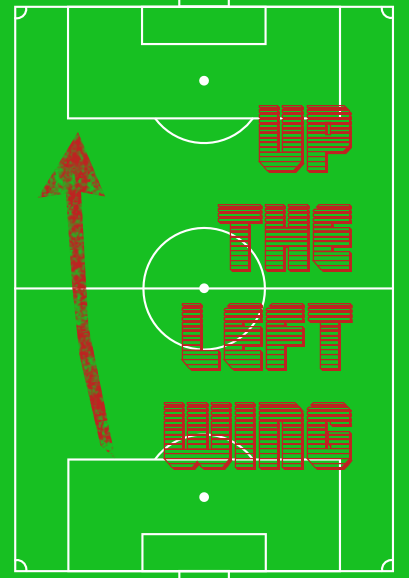
by Jay Baker
Feminism isn’t about women emulating men – and yet still more of them are watching Euro 2016 than watched the Women’s World Cup in 2015. The whole culture of football is still geared towards men, so most eyes go on men’s football, because most money goes on men’s football.
Of course, I grew up watching men’s football, even though the ban on the women’s game had by then been lifted. My dad started taking me to Doncaster Rovers games when I was aged 9. He played football since a young age, a small but nippy winger in local factory teams featuring former professional footballers, before turning to refereeing, instilling a sense of footballing fairness in me from the very start.
When my dad first started attending football matches in the latter part of the 1940s, aggregate league attendances were over 41 million. By the time I began going, in 1986, they were around 16 million, damaged by several years of increasing wages for workers and the corresponding diversity of leisure activities available to them – not to mention hooliganism putting people off. I was watching a very different version of football to the one my father had.
In my dad’s day, the players retired from the game and joined the factories blokes like him worked, still playing football for fun, because they never earned much from the sport. But after that, they very understandably got together and complained that, despite being entertainers, many of the fans were earning more money than they were. The Professional Footballers’ Association, led by the late Jimmy Hill, fought to have the maximum wage scrapped, and eventually, as we know, player salaries skyrocketed to astronomical proportions, to the point where today, unlike over in the American NFL, top teams make sure they get more of the TV revenue than smaller clubs, in order to help sustain their multi-million pound superstar wage bills.
And given the players are such celebrities now – like Hollywood movie stars – they’re also treated as role models. This is why convicted rapist Ched Evans provoked such an angry response even without a judge’s sentencing, by handling the whole case so badly – parents now spend a small fortune taking their children to games to watch stars like him play, and understandably, they expect better. No team touched him for months until, disappointingly, Chesterfield decided results mattered more than morals. Whether he ever successfully appeals or not, he’s left himself the picture of a misogynistic scumbag. Chesterfield, meanwhile, are sadly adhering to their constitutional obligation towards generating profits for their shareholders, whereas AFC Unity are incorporated as a not-for-profit social enterprise – legally, all proceeds must go directly back into the organisation.
 But the sport is full of scoundrels on the pitch and in the board room; players who dodge taxes, endorse sweatshop brands, and look out for number one (and I don’t mean the goalkeeper); they reek of individualism in what is supposed to be a team sport. They’re working class folk who kicked a ball around a field to make a million, marry a model, and live a tacky nouveau riche lifestyle in a gaudy millionaire’s slum somewhere in Cheshire.
But the sport is full of scoundrels on the pitch and in the board room; players who dodge taxes, endorse sweatshop brands, and look out for number one (and I don’t mean the goalkeeper); they reek of individualism in what is supposed to be a team sport. They’re working class folk who kicked a ball around a field to make a million, marry a model, and live a tacky nouveau riche lifestyle in a gaudy millionaire’s slum somewhere in Cheshire.
In 2012, the average Premiership club spent a shocking 70% of its turnover on player salaries – insanely, Manchester City were spending more than 100%! No wonder they’re jumping on the bandwagon with Manchester City Women and starting up New York City FC in the States; they’re developing a multinational brand that desperately requires different revenue streams to try and plug the hole.
Since I was a kid, I’ve witnessed what to my dad was an unknown phenomena of numerous clubs entering financial jeopardy and even administration. I’ve blogged at length and even included it in one of my documentaries how Ken Richardson ran our beloved Doncaster Rovers into the ground before being convicted, as many fans got together to form the Viking Supporters Cooperative (VSC). These kinds of trusts are nothing new, and often a threat to powerful vested interests – shortly after it was founded in 2008, Liverpool FC bigwigs referred to the newly-formed Spirit of Shankly (SOS) group as ‘a very small, yet highly-motivated group of agitators.’ And yet, a few years later, it was named Cooperative of the Year at the Social Enterprise North West Awards.
At the Keepmoat Stadium, on November 15th, 2014 – my birthday, no less – I was gifted a place on the board of directors by the voting members of the VSC, a legally constituted trust represented by a democratic steering group with a view to liaising with Doncaster Rovers officials and ensuring fan influence protected the club from the likes of Ken Richardson (or his predecessor John Ryan, who was certainly no saint, either).
At this time, having co-founded AFC Unity with Jane Watkinson, I began making my presence felt more at the matches of Doncaster Rovers Belles, the world-famous women’s team formed back when Doncaster Rovers were still playing at their old dilapidated Belle Vue stadium, the women initially calling themselves the Belle Vue Belles. They, too, have been burnt – being ousted from the Women’s Super League to make way for Manchester City Women and their millions of pounds of investment from the men’s club. The Belles, despite moving to the Keepmoat Stadium with their male counterparts, made it clear to me that they were pretty adamant about remaining independent. And who can blame them? They’ve finally made it to the WSL on their own merits. They’re struggling now, but if they went even further in the WSL, what then? The money is becoming even more important there, too. How can they compete all on their own?
 This is something I asked Carrie Dunn about when she spoke at FURD’s International Women’s Day event, and she admitted there were no easy answers: Just like the male players who made millions for their chairmen while paid a pittance, the women today very understandably want to be paid and valued in a similar manner to their male counterparts. This may mean a race to the top, thus it isn’t a coincidence the top names in women’s football are all too familiar: Manchester City… Chelsea… Arsenal… Liverpool… oh dear. It’s the same familiar names, the same elite interests. The 1% of the football world. To be successful means being part of that high class group.
This is something I asked Carrie Dunn about when she spoke at FURD’s International Women’s Day event, and she admitted there were no easy answers: Just like the male players who made millions for their chairmen while paid a pittance, the women today very understandably want to be paid and valued in a similar manner to their male counterparts. This may mean a race to the top, thus it isn’t a coincidence the top names in women’s football are all too familiar: Manchester City… Chelsea… Arsenal… Liverpool… oh dear. It’s the same familiar names, the same elite interests. The 1% of the football world. To be successful means being part of that high class group.
Lovers of the game all over are increasingly suspicious and disenchanted with the money-dominated nature of the big leagues. Manchester United’s fans, of course, simply went off and created their very own alternative, FC United of Manchester. They’ve been another success story, climbing up the non-league divisions to the point where they now just got themselves a brand-new stadium, paid a visit by the Tory politician who backed it – provoking outrage from a hard core of their followers, who stand true to the founding principles of the club.
 But what do they expect? The more money you make, the more professional you become – and then the more you find yourself no longer part of the solution…but part of the problem. Hey, even the progressive, forward-thinking, fan-owned FC Barcelona are still in debt. After all, it’s still in the same system as all the rest.
But what do they expect? The more money you make, the more professional you become – and then the more you find yourself no longer part of the solution…but part of the problem. Hey, even the progressive, forward-thinking, fan-owned FC Barcelona are still in debt. After all, it’s still in the same system as all the rest.
So what are the Belles striving for now, exactly? Are they wanting the bigger salaries, the greater turnover, the corporate sponsorships, and the disconnection from the community that unavoidably goes along with it all? Is that what they want up there? Maybe they, too, want to chink champagne glasses with Tory politicians. One of the head honchos of the Belles recently disconnected from me on Twitter because I expressed my personal support for Jeremy Corbyn!
There is no trickle-down effect here, either. The women’s World Cup was better than those before it, got a better-than-usual coverage via the BBC, and had people mentioning it around the water cooler at work for the very first time – for a few days. At grassroots, women’s football is still used by the men’s teams it’s usually associated with as a cash-cow to gain funds intended to go to women’s football, but in fact spent on the men – so it barely reaches the women’s game.
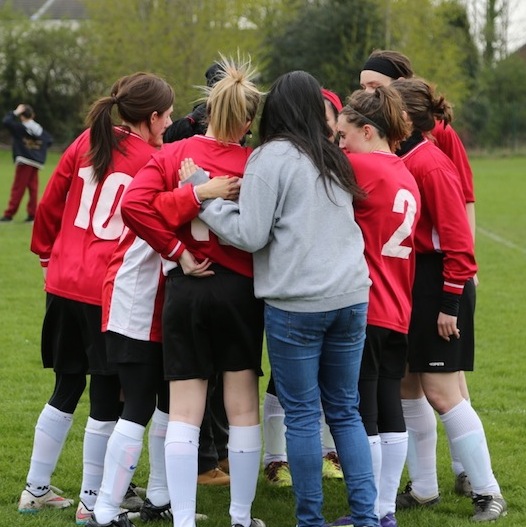 AFC Unity is an independent women’s football club, so it’s all about the women. Because we’re one of the few of our kind, when we first set up, it was bloody difficult, but we still played games with as few as nine players, losing 8-0, and never once complained.
AFC Unity is an independent women’s football club, so it’s all about the women. Because we’re one of the few of our kind, when we first set up, it was bloody difficult, but we still played games with as few as nine players, losing 8-0, and never once complained.
In our second season, we were fielding a full team every week, and beating women’s teams from established men’s clubs by even greater margins than that, when they couldn’t field full teams themselves – precisely because women’s football was an afterthought for their club. Some even had the audacity to ask us to put our players – who joined us for our ethos – into their shirts as ringers, violating league rules, just to fill their team, because of their own failings. As though we should help the established clubs who never helped us, just because they don’t prioritise women’s football.
Now, in our third season, demand is so high we’ve had to set up a second team. Our retention rates outdo our recruitment rates because it’s tough for people to find out about our indie women’s team – but when they do, they rarely leave, they love it so much. We keep a positive ethos, and run a tight ship, also known as “The Stalinist Dictatorship” by the same mentality that got Sheffield derisively called “The Socialist Republic of South Yorkshire” by the city’s then-lone Tory, Irvine Patnick.
We are known for going to great pains to tackle negativity and keep the majority of players smiling at the expense of individual “bad apples.” They’re still smiling, and our aim is to keep smiles on faces.
 I always say, when you’re just about winning, you’ve nothing else left on the days you lose, but we’re about much more than winning matches; we measure success differently. Our aim is to engage and empower women, and keep a connection to our roots, with things like the Football for Food campaign. We do tangible things to help our community, right here, right now, by tackling food poverty and feeding people.
I always say, when you’re just about winning, you’ve nothing else left on the days you lose, but we’re about much more than winning matches; we measure success differently. Our aim is to engage and empower women, and keep a connection to our roots, with things like the Football for Food campaign. We do tangible things to help our community, right here, right now, by tackling food poverty and feeding people.
I find myself so immersed in grassroots football that at Carrie Dunn’s talk, I erroneously referred to Ellen White as “Ellen Smith” – because I’m more familiar with a top goalscorer of the Sheffield & Hallamshire Women’s County Football League than I am with an England international.
This is partly because once you’re involved in running such a club, once you’ve got the bug and experienced that buzz of real grassroots, community-driven football, nothing is ever quite the same again. It’s like coming off drugs and switching to orange juice with a drop of liquid alfalfa in it. It’s not even close to the thrill you had.
 As with the Belles, I still go to see Doncaster Rovers play on occasion, but I’m no longer a season ticket holder. There’s only so many times I can sit and watch wealthy men serve as the sole justification for a ticket price twice as much as it’d cost for me to sit in a warm cinema enjoying two solid hours of entertainment…even while still watching millionaire celebrity superstars like George Clooney – the movie theatre still costs less. How many times can I endure “my local team”? Hey, what does that even mean in an era when they’re shifting clubs from Wimbledon to Milton Keynes? And I can count on one hand the Doncaster Rovers players who actually have any connection to Doncaster itself. So what are we being loyal to, exactly? As Seinfeld joked, you’re basically just, well, cheering for clothes.
As with the Belles, I still go to see Doncaster Rovers play on occasion, but I’m no longer a season ticket holder. There’s only so many times I can sit and watch wealthy men serve as the sole justification for a ticket price twice as much as it’d cost for me to sit in a warm cinema enjoying two solid hours of entertainment…even while still watching millionaire celebrity superstars like George Clooney – the movie theatre still costs less. How many times can I endure “my local team”? Hey, what does that even mean in an era when they’re shifting clubs from Wimbledon to Milton Keynes? And I can count on one hand the Doncaster Rovers players who actually have any connection to Doncaster itself. So what are we being loyal to, exactly? As Seinfeld joked, you’re basically just, well, cheering for clothes.
[youtube https://www.youtube.com/watch?v=we-L7w1K5Zo]
Despite being promoted from Division 3 in our first ever season and now, against all these odds, miraculously hanging in there in Division 2 of the Sheffield & Hallamshire Women’s County Football League, AFC Unity recently experienced a record defeat, losing an hysterical 14-0 to Barnsley in the Women’s Challenge Cup, and we still loved every minute of it. There actually wasn’t that much between most of our players and theirs, in terms of skill level and raw talent – but we train for an hour a week, about a quarter of what they do, and that’s why they’re a well-oiled machine, striving for the WSL, storming up the pyramid. Rather them than us, to be honest, as they head up into the darkest echelons of women’s football.
I’ve long suggested to our Board of Directors inserting into AFC Unity’s Memorandum and Articles of Association a clause that prevents players ever receiving a fee for their participation. If we can subsidise their activities so they pay next to nothing, great. But never would I advocate training much more, and treating it like a job, or even becoming a job. When a manager starts shouting at his or her players, ‘What am I paying you for?’ it’s the beginning of the end for the spirit of the sport. When football is driven by money, it loses its connection to grassroots.
After all, money is the root of all evil.
This includes extracts from Jay Baker’s own blog
 by Jay Baker
by Jay Baker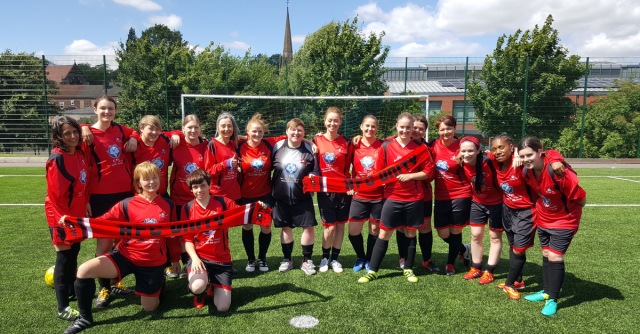

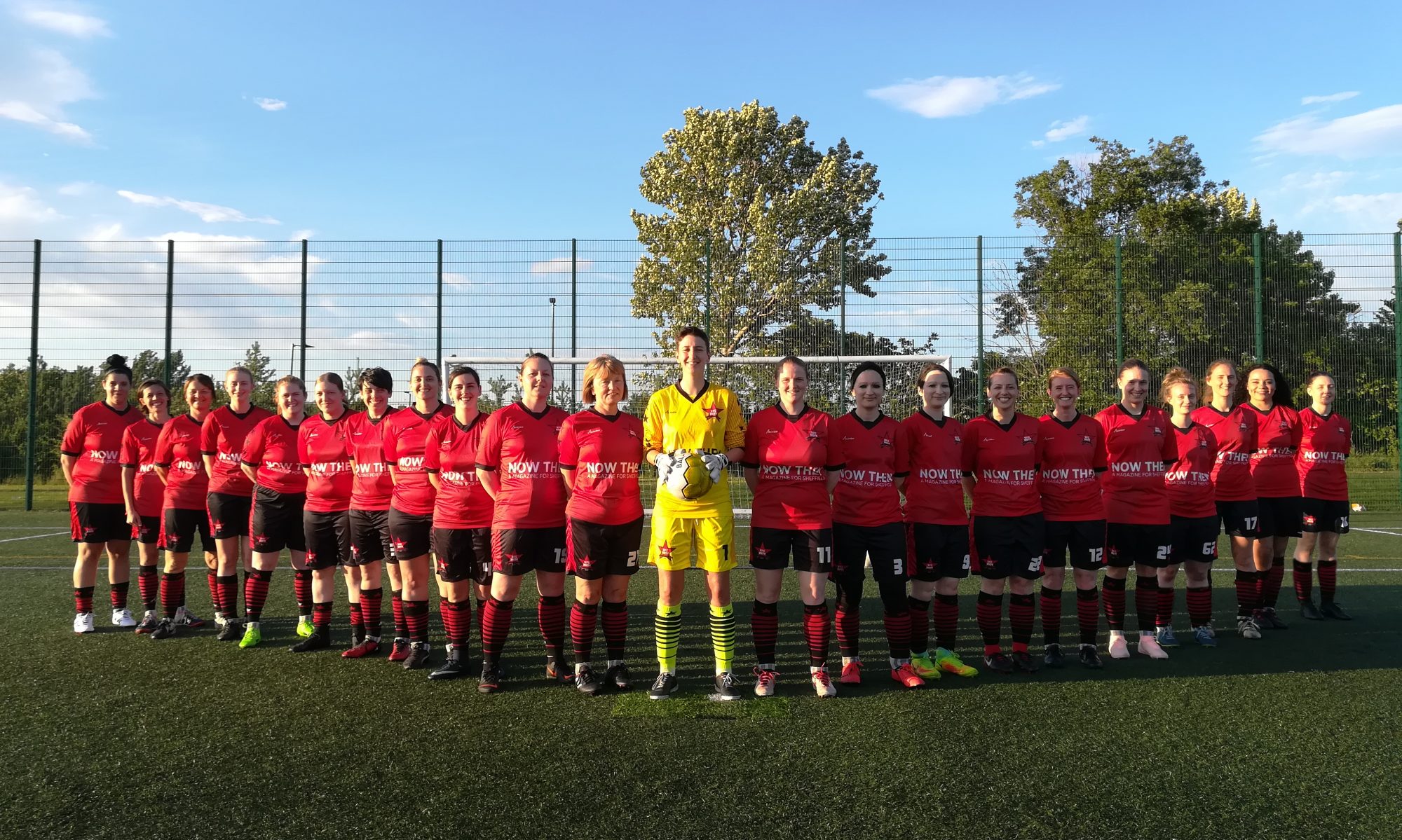
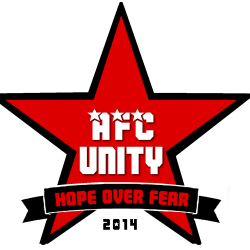


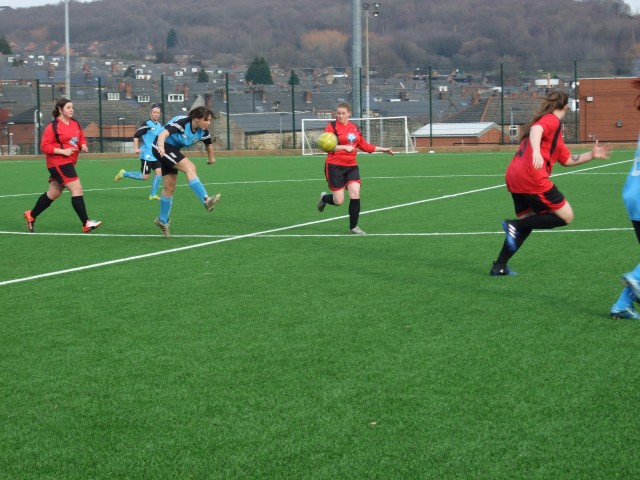 finally starting to look settled – it was only 1-2 at half-time, at which point I tried reverting to last season’s old formation, leaving us with just two forwards unable to apply their pressing style, and under bombardment; conceding six more goals in the 45 minutes that followed, an incredible example of football evolution meaning you can’t go back in time and unlearn something so much harder yet better: it’s hard, even wrong, for us to go back to old styles that don’t suit us anymore. Being defensive means being on the back-foot, and surrendering initiative, and that just doesn’t fit us, as evidenced by that 1-8 loss.
finally starting to look settled – it was only 1-2 at half-time, at which point I tried reverting to last season’s old formation, leaving us with just two forwards unable to apply their pressing style, and under bombardment; conceding six more goals in the 45 minutes that followed, an incredible example of football evolution meaning you can’t go back in time and unlearn something so much harder yet better: it’s hard, even wrong, for us to go back to old styles that don’t suit us anymore. Being defensive means being on the back-foot, and surrendering initiative, and that just doesn’t fit us, as evidenced by that 1-8 loss.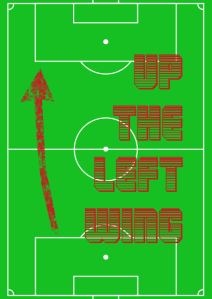 by Jay Baker
by Jay Baker
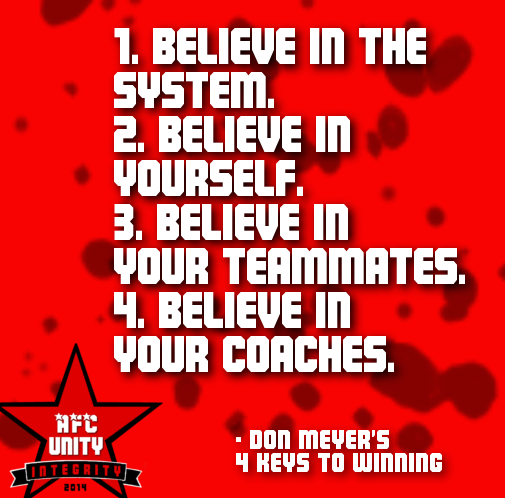 But what does this mean in practice for players?
But what does this mean in practice for players?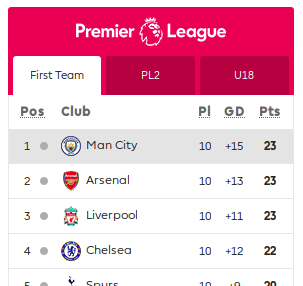 commonplace. As I write, the current English Premiership is dominated by teams who either
commonplace. As I write, the current English Premiership is dominated by teams who either 
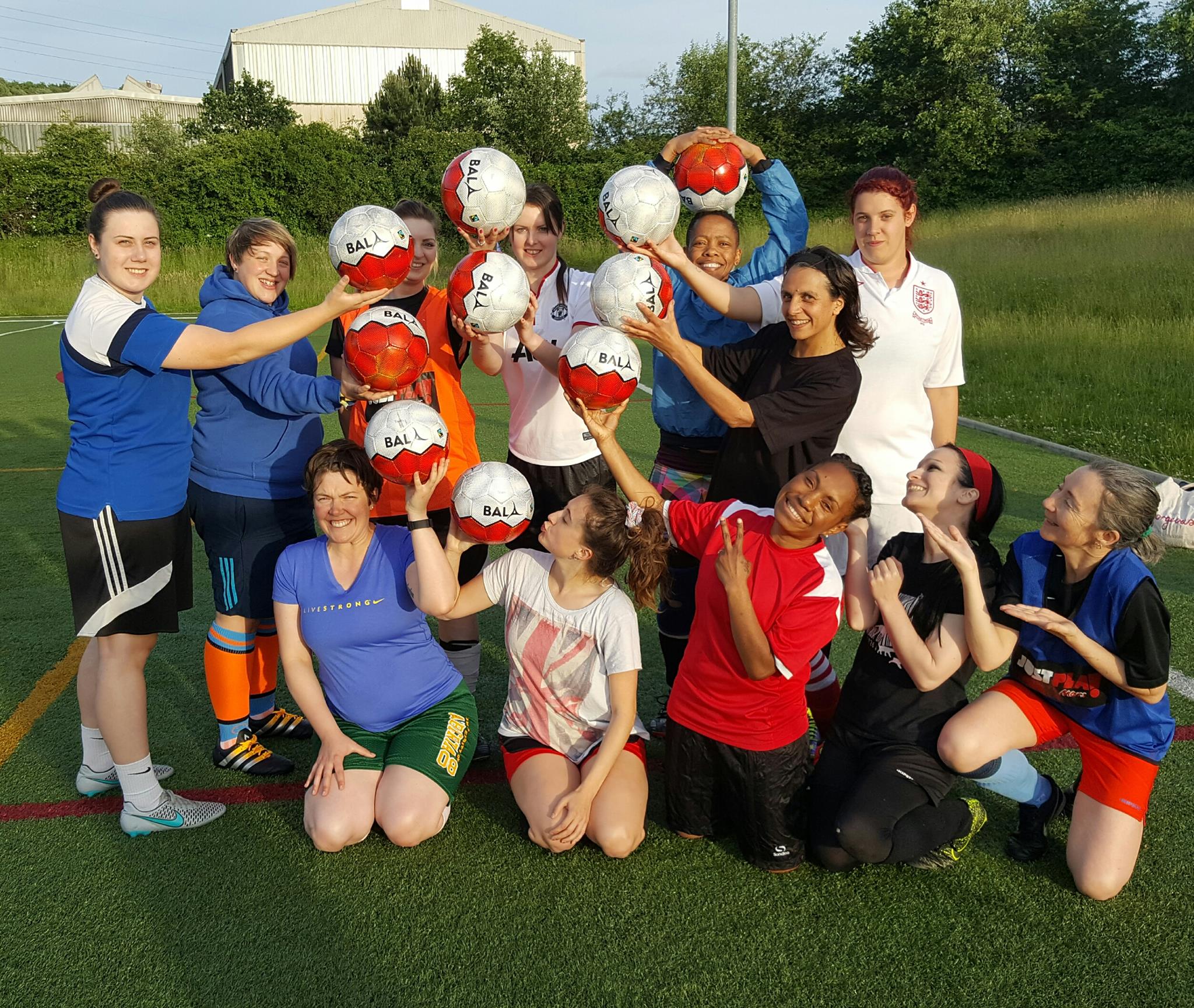

 But the sport is full of scoundrels on the pitch and in the board room; players who dodge taxes, endorse sweatshop brands, and look out for number one (and I don’t mean the goalkeeper); they reek of individualism in what is supposed to be a team sport. They’re working class folk who kicked a ball around a field to make a million, marry a model, and live a tacky nouveau riche lifestyle in a gaudy millionaire’s slum somewhere in Cheshire.
But the sport is full of scoundrels on the pitch and in the board room; players who dodge taxes, endorse sweatshop brands, and look out for number one (and I don’t mean the goalkeeper); they reek of individualism in what is supposed to be a team sport. They’re working class folk who kicked a ball around a field to make a million, marry a model, and live a tacky nouveau riche lifestyle in a gaudy millionaire’s slum somewhere in Cheshire. This is something I asked Carrie Dunn about when she spoke at FURD’s International Women’s Day event, and she admitted there were no easy answers: Just like the male players who made millions for their chairmen while paid a pittance, the women today very understandably want to be paid and valued in a similar manner to their male counterparts. This may mean a race to the top, thus it isn’t a coincidence the top names in women’s football are all too familiar: Manchester City… Chelsea… Arsenal… Liverpool… oh dear. It’s the same familiar names, the same elite interests. The 1% of the football world. To be successful means being part of that high class group.
This is something I asked Carrie Dunn about when she spoke at FURD’s International Women’s Day event, and she admitted there were no easy answers: Just like the male players who made millions for their chairmen while paid a pittance, the women today very understandably want to be paid and valued in a similar manner to their male counterparts. This may mean a race to the top, thus it isn’t a coincidence the top names in women’s football are all too familiar: Manchester City… Chelsea… Arsenal… Liverpool… oh dear. It’s the same familiar names, the same elite interests. The 1% of the football world. To be successful means being part of that high class group. But what do they expect? The more money you make, the more professional you become – and then the more you find yourself no longer part of the solution…but part of the problem. Hey, even the progressive, forward-thinking, fan-owned FC Barcelona are still in debt. After all, it’s still in the same system as all the rest.
But what do they expect? The more money you make, the more professional you become – and then the more you find yourself no longer part of the solution…but part of the problem. Hey, even the progressive, forward-thinking, fan-owned FC Barcelona are still in debt. After all, it’s still in the same system as all the rest. AFC Unity is an independent women’s football club, so it’s all about the women. Because we’re one of the few of our kind, when we first set up, it was bloody difficult, but we still played games with as few as nine players, losing 8-0, and never once complained.
AFC Unity is an independent women’s football club, so it’s all about the women. Because we’re one of the few of our kind, when we first set up, it was bloody difficult, but we still played games with as few as nine players, losing 8-0, and never once complained. I always say, when you’re just about winning, you’ve nothing else left on the days you lose, but we’re about much more than winning matches; we
I always say, when you’re just about winning, you’ve nothing else left on the days you lose, but we’re about much more than winning matches; we  As with the Belles, I still go to see Doncaster Rovers play on occasion, but I’m no longer a season ticket holder. There’s only so many times I can sit and watch wealthy men serve as the sole justification for a ticket price twice as much as it’d cost for me to sit in a warm cinema enjoying two solid hours of entertainment…even while still watching millionaire celebrity superstars like George Clooney – the movie theatre still costs less. How many times can I endure “my local team”? Hey, what does that even mean in an era when they’re shifting clubs from Wimbledon to Milton Keynes? And I can count on one hand the Doncaster Rovers players who actually have any connection to Doncaster itself. So what are we being loyal to, exactly? As Seinfeld joked, you’re basically just, well, cheering for clothes.
As with the Belles, I still go to see Doncaster Rovers play on occasion, but I’m no longer a season ticket holder. There’s only so many times I can sit and watch wealthy men serve as the sole justification for a ticket price twice as much as it’d cost for me to sit in a warm cinema enjoying two solid hours of entertainment…even while still watching millionaire celebrity superstars like George Clooney – the movie theatre still costs less. How many times can I endure “my local team”? Hey, what does that even mean in an era when they’re shifting clubs from Wimbledon to Milton Keynes? And I can count on one hand the Doncaster Rovers players who actually have any connection to Doncaster itself. So what are we being loyal to, exactly? As Seinfeld joked, you’re basically just, well, cheering for clothes.